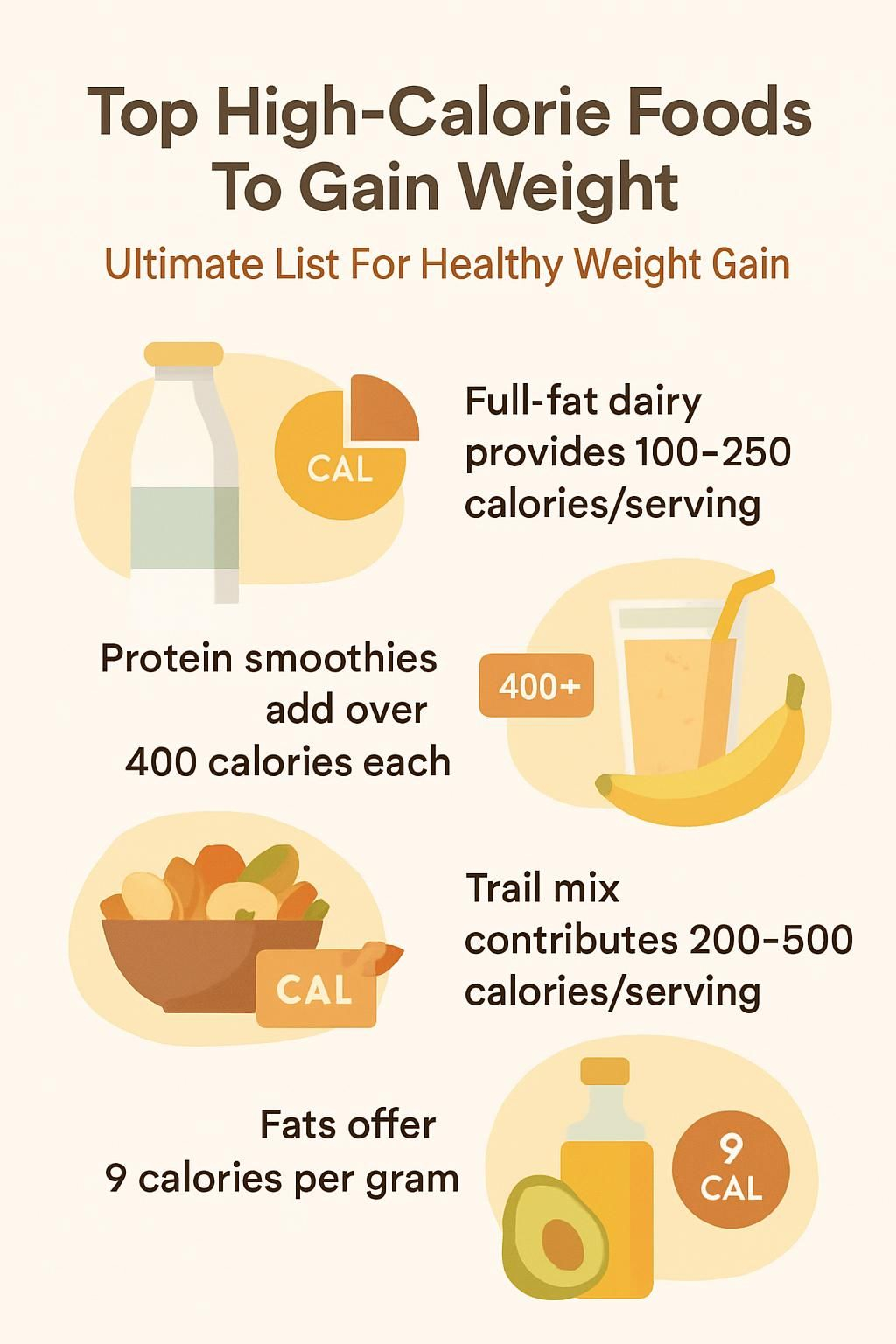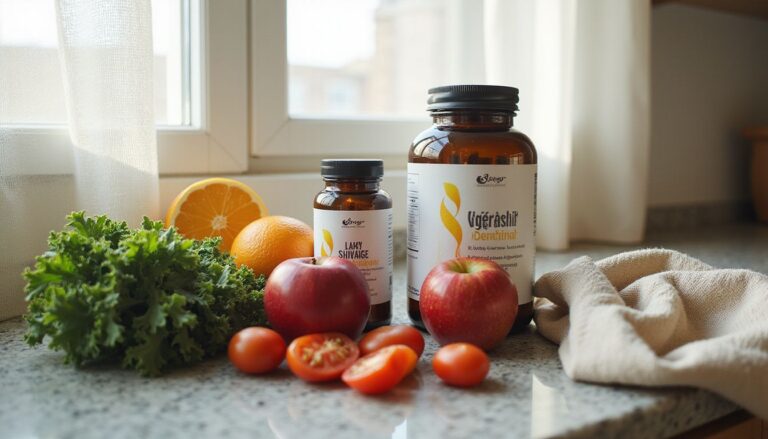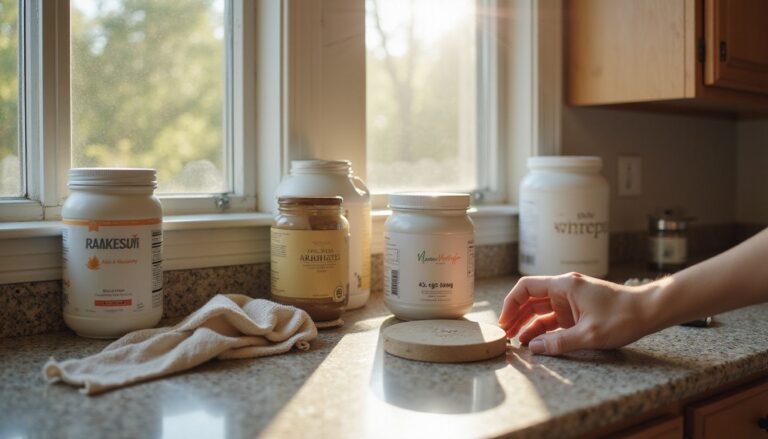Top High-Calorie Foods To Gain Weight: Ultimate List For Healthy Weight Gain
Our Nutrition Assistant AI Suite will transform your body. You will lose fat, get toned, and build muscle. Gain confidence and optimal health.
You may want to gain weight or build muscle but struggle to eat enough each day. High-calorie foods make that task easier. They deliver extra energy and important nutrients for healthy weight gain.
This guide lists the best high-calorie foods to gain weight, from healthy fats to protein-rich choices and satisfying snacks. Each option is explained in clear, simple terms. Use these ideas to raise your calorie intake and move toward a healthy weight goal.
Read on for practical foods and tips you can add to any meal and snack today.
Key Takeaways
- Foods like full-fat dairy, nuts, red meat, and avocados often provide 100 to 250 calories or more per serving, which helps healthy weight gain.
- Homemade protein smoothies can add over 400 calories each, so you meet daily needs without very large meals.
- Complex carbohydrates, such as rice, potatoes, and whole grain bread, raise energy intake and supply fiber for digestion.
- Fats and oils provide 9 calories per gram, more than double protein or carbs, so they are efficient for boosting daily calories.
- Dietitians often suggest high-calorie snacks like trail mix with 200 to 500 calories per serving and dried fruit with 130 or more calories per handful.

Why is Eating High-Calorie Foods Important for Healthy Weight Gain?

Eating high-calorie foods is essential if you want to gain weight in a healthy way. Your body must take in more calories than it burns. A small, steady surplus supports growth, hormone balance, and muscle strength.
For example, underweight children often use calorie-dense foods, such as peanut butter, whole milk, nuts, and cheese, to meet energy and nutrient needs. Dietitians recommend items like dried fruit, nut butter, and avocados because they pack calories with vitamins and minerals in each bite.
High-calorie, nutrient-rich foods are the foundation of a healthy weight gain plan.
Skipping calorie-dense foods can force your body to use stored energy, which leads to more weight loss. Vegetarians and people with limited diets may find it harder to hit calorie goals. Focusing on whole grain bread, rice, seeds, and Greek yogurt can help.
During strength training, I finally gained muscle after I added smoothies with banana, nut butter, dairy milk, and whey protein. Those drinks added 400 to 600 calories per day without making me feel sluggish.
Key Nutrients That Help You Gain Weight
Your body needs the right nutrients to add muscle and healthy weight. Balanced meals that are calorie-dense deliver energy and building blocks for growth.
How Does Protein Support Weight Gain?
Protein builds and repairs muscle tissue. Each gram gives 4 calories, which increases your total intake. Aim to include protein at each meal, especially if you lift weights or do resistance exercise.
Good sources include lean meat, red meat, poultry, fish, eggs, beans, and dairy products. Red meat provides protein, leucine, and creatine, which support muscle gain. Whole eggs offer complete protein and healthy fats, and the yolk is rich in nutrients.
Homemade protein smoothies, whole milk, yogurt, and cheese deliver both calories and protein. For plant-based diets, tofu, legumes, nuts, and seeds supply protein with healthy fats. Pairing protein with training helps your body use those building blocks for muscle growth.
Why Are Healthy Fats Essential for Gaining Weight?
Healthy fats are calorie-dense, at 9 calories per gram. This makes it easy to raise calories without large portions. Fats also help you stay full and add flavor.
Avocados have about 240 calories each and provide heart-friendly fats. Olive oil and avocado oil add around 120 calories per tablespoon. Nut butters, like peanut butter, offer close to 100 calories per tablespoon. Full-fat milk, cheese, and cream also increase calories with each serving.
Many people find meals with healthy fats keep hunger away longer than carb-only plates. For instance, a salad with olive oil adds flavor and quick calories that support weight gain goals.
After switching my breakfast from low-fat yogurt to full-fat Greek yogurt topped with walnuts, I found it easier to reach my daily calorie goal while still enjoying tasty and filling meals.
What Role Do Complex Carbohydrates Play in Weight Gain?
Complex carbohydrates give slow, steady energy and raise total calories. Oatmeal, brown rice, whole grain bread, potatoes, corn, and sweet potato supply starch and fiber that aid digestion.
One cup of cooked rice offers about 160 calories. Whole grain pasta and bread add energy in modest portions. Starchy foods, such as potatoes and sweet potatoes, support training and recovery.
Many people aim for 45 to 65 percent of calories from carbs. This range helps you eat more without feeling stuffed. Next, review the best high-calorie foods to add to your routine.
Best High-Calorie Foods to Eat for Weight Gain
Choosing high-calorie foods gives you easy ways to add energy and nutrients. These picks make meals more satisfying and support muscle growth.
How Can Homemade Protein Smoothies Help You Gain Weight?
Homemade smoothies often beat store-bought shakes on calories and quality. Blend whole milk, yogurt, bananas, nut butter, seeds, and fruit to raise both protein and calories.
Example shake: 1 scoop chocolate whey, 1 banana, 1 tablespoon peanut butter, and 1 cup whole milk. That mix can top 400 calories in one glass. Each tablespoon of nut butter adds about 90 to 100 calories.
Smoothies help when you are busy or lack appetite for big meals. If you avoid lactose, use soy milk, almond milk, coconut milk, or rice milk. I like a banana smoothie with whey protein and almond butter after training to boost recovery and keep a steady surplus.
Then consider whether dairy milk fits well in your plan.
Is Dairy Milk a Good Option for Adding Calories?
Whole milk gives about 150 calories per cup with protein, fats, and carbohydrates. Two glasses per day can lift your total intake if you want to build muscle or raise your body mass index.
Milk is rich in calcium and casein protein, which digests slowly and supports muscle. Pour it over cereal or blend it into shakes. Full-fat yogurt and cheese add even more calories per serving than low-fat versions.
If you cannot digest lactose, plant milks such as almond or soy work well in oatmeal and soups. After an illness last year, I swapped skim for whole milk. Within weeks, I felt stronger and met higher targets at each meal.
Why Include Nuts and Nut Butter in Your Diet?
Nuts and nut butter are compact calorie sources. One tablespoon of peanut butter has about 90 to 100 calories. A handful of almonds, walnuts, or cashews adds healthy fats, protein, and key vitamins.
Spread nut butter on toast, stir it into oatmeal, or blend it into smoothies. Nuts also supply fiber and plant protein. I started adding cashew butter to waffles and kept trail mix in my gym bag. It became easier to eat more without feeling too full.
Seeds like chia and flax pair well with nuts. They make granola and trail mix even more calorie-dense.
How Does Red Meat Contribute to Weight Gain?
Red meat such as steak, beef, pork, and lamb is rich in protein that supports skeletal muscle. Higher fat cuts are more calorie-dense, so one serving can top 250 calories.
Red meat also contains leucine and creatine, which help you train harder and build muscle. Iron and vitamin B12 in meat support energy levels and overall health.
Many lifters pair steak with starchy sides like potatoes or whole grain bread. Last winter, I often chose grilled steak with sweet potatoes. That combo raised calories and helped me meet a sports weight target.
What Are the Benefits of Salmon and Oily Fish?
Oily fish such as salmon, sardines, mackerel, Surmai, and Ravas are nutrient-dense and calorie-rich. A typical serving of salmon has about 165 calories and around 15 grams of protein.
These fish provide omega-3 fats that support heart, brain, and immune health. Eating two or three servings per week raises calories without relying on junk food. I added grilled mackerel to salads and noticed steadier energy through the week.
Oily fish works in sandwiches or main dishes. Nutrition experts recommend it for both kids and adults who want the healthiest muscle-building foods.
Why Are Whole Eggs Effective for Healthy Weight Gain?
Whole eggs offer complete protein and healthy fats that help you gain weight. One egg gives about 70 calories. The yolk carries most of the vitamins, including choline and vitamin D.
Eat eggs at breakfast or as a snack to meet daily goals. Pair eggs with avocado, whole grain toast, or cheese for more calories and nutrients. They are easy to boil, scramble, bake into muffins, or fold into an omelet.
During my weight plan, I ate boiled egg slices on toast and mixed eggs into pancake batter. That made it simple to lift daily calories without heavy meals.
How Do Potatoes and Complex Carbohydrates Aid Weight Gain?
Potatoes and sweet potatoes supply starch, fiber, and resistant starch, which feeds good gut bacteria. A medium baked potato has about 150 to 200 calories. One cup of mashed potatoes has roughly 214 calories.
Top potatoes with cheese, olive oil, or chili to add 120 calories or more. Sweet potatoes bring vitamin A and antioxidants. Corn also gives steady energy without sharp blood sugar spikes.
I noticed that roasted potatoes or quinoa at lunch raised my intake by more than 300 calories per day without discomfort. Combine these carbs with eggs, beans, or meat to support muscle gain.
Can Rice Help You Increase Your Calorie Intake?
Rice is a simple way to add energy. One cup of cooked white rice provides about 160 calories. Brown rice gives extra fiber and nutrients per serving.
Pair rice with protein-rich curries, vegetables, or make lentil khichdi for taste and balance. Rice is easy to digest and fits most diets.
Eating rice regularly supports a calorie surplus if you want to gain weight in a healthy way. It is budget-friendly and versatile in many cuisines.
What Are the Advantages of Whole Grain Bread and Pasta?
Whole grain bread and pasta provide complex carbohydrates plus fiber, vitamins, and minerals. They support steady energy and better digestion compared with refined grains.
Sourdough may aid gut health due to live cultures. Pair bread with eggs, cheese, paneer, or meat to lift protein and calories. Whole grain pasta combines well with olive oil, vegetables, and cheese for a higher-calorie plate.
Avocado toast on whole grain bread is a filling breakfast or snack. These staples fit easily into any meal plan that aims for healthy weight gain.
How Do Avocados Support Weight Gain?
Avocados provide about 240 calories per fruit and contain fiber, vitamins, and heart-friendly fats. They fit plant-based and omnivore diets.
Spread avocado on bread, serve it with eggs, or slice it into sandwiches and salads. Guacamole works as a dip or topping. Avocado oil is even more calorie-dense and is useful for cooking and dressings.
Regular avocado intake helps you hit daily calorie goals while keeping nutrition high.
Why Should You Add Cheese to Your Meals?
Cheese is a concentrated source of calories and saturated fat. Full-fat cheese has about 110 to 120 calories per ounce.
Add cheese to sandwiches, pasta, salads, or scrambled eggs with spinach to raise calories fast. Cheese offers protein and calcium for bone health. Many cheese sticks have roughly 80 to 100 calories each, which makes them handy snacks.
I often added cheese slices to toast with tomatoes during high school sports season. It helped me meet goals during busy weeks.
Is Full-Fat Yogurt Beneficial for Gaining Weight?
Full-fat yogurt is calorie-dense and supports gut health with probiotics. One cup of strained yogurt provides about 130 to 165 calories, along with protein and calcium.
Mix yogurt with honey, granola, or chopped fruit for a higher-calorie bowl. Greek yogurt usually has more protein and calories than regular types. Choose full-fat to support muscle growth.
Top with chia or flax seeds for more nutrients. Flavored versions can work, but many contain added sugar. Yogurt fits well at breakfast, as a snack, or blended into smoothies.
How Can Dried Fruits Boost Your Calorie Intake?
Dried fruits such as raisins, apricots, and dates are compact calorie sources. A small handful can offer more than 130 calories. They are easy to add to cereal, yogurt, and trail mix.
Dates blended with honey can sweeten smoothies and add energy. Pair dried fruit with nuts or nut butter to increase calorie density. Since dried fruit stores well, it makes on-the-go snacking simple.
What Makes Dark Chocolate a Good High-Calorie Food?
Dark chocolate is calorie-dense and rich in antioxidants. A 100 gram bar can contain about 600 calories and 43 grams of fat.
Combine dark chocolate with nuts or dried fruit to add hundreds of calories quickly. I tuck small pieces into my snack bag with nut butter to reach daily targets faster.
Dark chocolate suits many diets and works in desserts, trail mix, or melted on toast.
How Do Fats and Oils Help Increase Calories?
Fat contains 9 calories per gram. Healthy oils, including avocado, extra virgin olive, and coconut, raise calories in small amounts.
Drizzle oils on salads, use them in stir-fries, or add to smoothies. Butter and ghee add traditional flavor during cooking and increase totals. Dietitians suggest moderation, since too much fried or ultra-processed food can raise the risk of obesity, cardiovascular disease, or cancer.
Next, explore high-calorie snacks like trail mix and granola bars to boost your intake.
High-Calorie Snacks to Add to Your Diet
High-calorie snacks help you add energy between meals. Smart choices can support muscle gain and keep you on track.
Why Is Trail Mix a Great Snack for Weight Gain?
Trail mix can add hundreds of calories with little effort. One serving often ranges from 200 to 500 calories, depending on the mix. Nuts and seeds supply healthy fats that keep you full longer.
Dried fruits provide quick-energy carbs. Personalize your mix with chocolate chips, coconut flakes, or extra dried fruit. Trail mix suits plant-based and omnivore diets.
I carry a small bag on hikes and long workdays. It is compact, shelf-stable, and keeps energy steady between meals.
Are Granola Bars Effective for Adding Calories?
Granola bars offer a quick, portable option. Many are made with oats, nuts, seeds, and sweeteners that raise energy density. A store-bought bar often provides 150 to 300 calories, and homemade bars can contain more.
Choose bars with nuts and seeds to boost protein and healthy fats. Pair a bar with yogurt or milk for extra calories and protein. During college training, packing homemade bars helped me meet daily targets.
Some brands include added protein and fiber for fullness. These snacks can lift your total by hundreds of calories per day.
How Does Cereal with Whole Milk Help with Weight Gain?
Cereal with whole milk combines carbohydrates, protein, and fat. Whole milk adds about 150 calories per cup.
Pick whole grain cereals for extra fiber and nutrients. Add dried fruits, such as apple or dates, and nuts to increase calories. A drizzle of honey raises the total and improves taste.
This option works for adults and children. I gained healthy weight in college with whole grain cereal, whole milk, and a handful of almonds. It kept me satisfied between classes.
Why Include Peanut Butter on Toast as a Snack?
Peanut butter on toast is an easy calorie booster. Two tablespoons of peanut butter on whole grain toast adds about 200 calories. Most of those calories come from healthy fats and protein.
Whole grain bread supplies complex carbs for steady energy. Add sliced bananas or a little honey to lift the total further. This snack fits breakfast, a midday break, or post-workout fuel.
It takes minutes to prepare and can quickly add hundreds of calories to your day. Consistency with snacks like this helps maintain the surplus needed for healthy weight gain.
Can Custards and Puddings Support Healthy Weight Gain?
Custards and puddings made with whole milk are calorie-dense desserts. Each serving supplies energy, protein, and calcium.
Increase nutrition by mixing in fruit, nuts, or dark chocolate. Full-fat versions offer the most calories per bite. Homemade recipes let you control both calories and sugar content.
These snacks work well for kids and adults who have smaller appetites. During recovery last year, I used homemade pudding between lunch and dinner. It helped me keep a steady surplus without feeling stuffed.
Plant-Based High-Calorie Foods for Weight Gain
Plant-based choices can be rich in calories and nutrients. These foods make it easier to meet targets without huge portions.
How Do Tofu and Paneer Help You Gain Weight?
Tofu and paneer offer protein and calories in small servings. Paneer, or Indian cottage cheese, has about 165 calories and 15 grams of protein per 100 grams. It also provides calcium.
Tofu suits those who avoid dairy. Stir-fry it, grill it, or add it to soups to lift calories. Toss paneer cubes into salads or sandwiches for extra protein at lunch.
I often add tofu cubes to noodle bowls after workouts. That bump in protein and calories helps recovery and growth.
Why Are Legumes Like Beans, Lentils, and Chickpeas Good Choices?
Legumes, including beans, lentils, and chickpeas, give plant protein and complex carbs in one package. Cooked lentils provide about 230 calories per cup and lots of fiber. Beans deliver similar benefits and promote fullness.
Legumes help if you avoid animal products or limit dairy. Make calorie-dense lentil soups or pair beans with rice. White rice provides about 204 calories per cup and balances the meal.
Chickpeas are versatile. Make hummus or roast them for a crunchy snack. I started adding roasted chickpeas to grain bowls and kale salads to boost energy during sports training.
What Are the Benefits of Seeds Such as Chia, Flax, and Pumpkin?
Seeds are small but calorie-rich. Chia and flax bring healthy fats, protein, and fiber. Sprinkle them on oatmeal or blend into smoothies to lift calories without large portions.
Pumpkin seeds provide magnesium and zinc along with healthy fats. Sunflower seeds make an easy snack that can add hundreds of calories. Add seeds to yogurt or whole grain toast to meet higher targets.
How to Increase Your Calorie Intake Effectively
A steady surplus drives healthy weight gain. Small changes across the day add up fast.
What Are Easy Ways to Add Extra Calories to Meals?
Use these tips to raise your intake without feeling overly full.
- Mix nut butter into oatmeal or yogurt for 90 to 100 extra calories per tablespoon. Peanut butter on toast can quickly add hundreds of calories.
- Drink whole milk instead of water or skim. One cup provides about 150 calories and pairs well with cereal or smoothies.
- Add avocado slices to sandwiches, salads, or eggs. Each avocado contains roughly 240 calories.
- Stir cheese into pasta, eggs, casseroles, or vegetables. Cheese sticks are a convenient snack, and grated cheese boosts meals without much volume.
- Cook with healthy oils like olive or canola. One tablespoon adds about 120 calories.
- Top baked potatoes with chili, sour cream, or shredded cheese. Potatoes bring complex carbs and pair well with fats and protein.
- Blend homemade smoothies with ingredients such as banana, chocolate whey, oats, and full-fat yogurt. Ice cream can raise calories for those who need more.
- Snack on trail mix with nuts, dried fruit, and dark chocolate chips to add variety between meals.
These everyday foods help you reach weight gain goals while keeping meals tasty and satisfying.
How Can Calorie-Dense Cooking Oils Boost Your Intake?
Olive, avocado, and coconut oils have 9 calories per gram. A drizzle on meals can add hundreds of calories without extra chewing.
Guidelines suggest that 20 to 35 percent of your daily calories come from fats. Use oil when cooking eggs, sautéing vegetables, or dressing salads. These fats support recovery and help prevent deficiencies in people who are underweight.
Balance oils with whole foods for the best results.
Why Should You Incorporate Snacks Throughout the Day?
Snacks help you add calories between meals without discomfort. Choose nutrient-dense items like nut butter, yogurt, or cheese sticks.
Frequent small meals work well for kids and adults who tire of large portions. Smoothies with whole milk and fruit are a tasty way to raise energy. Regular snacking makes your calorie surplus easier to maintain.
Common Questions About Healthy Weight Gain
Here are clear answers to common questions about gaining weight in a healthy way.
How Many Calories Should I Consume to Gain Weight?
Most people see progress with 300 to 500 extra calories per day above their needs. For example, if you burn 2,200 calories daily, aim for 2,500 to 2,700 to gain slowly. Fast metabolisms or heavy training may require more.
A snack can quickly add hundreds of calories. Try nut butter on whole grain bread or full-fat yogurt with dried fruit and seeds. I often used smoothies with whole milk, peanut butter, and bananas to hit daily goals during high school sports.
What Foods Should I Avoid When Trying to Gain Weight?
Limit cakes, biscuits, and fried foods. They are calorie-rich but low in nutrients. These options can crowd out the foods that build muscle and support health.
Avoid relying on snacks that only offer sugar or processed oils. A bag of chips might lift calories, but it does not fuel workouts or daily tasks well. Whole foods helped me feel better while still moving the scale upward.
How Long Does It Usually Take to See Weight Gain Results?
Many people notice results within two to four weeks after raising daily calories. A common target is 0.5 to 1 pound per week, which usually needs a surplus of 250 to 500 calories per day.
Changes show on the scale first, then in how clothes fit. Slow, steady gain supports muscle growth if you add strength training. Tracking meals and checking progress weekly helps you adjust as needed.
Conclusion
High-calorie foods support healthy weight gain and muscle growth. Nut butter, full-fat dairy, red meat, whole grains, and avocados make it easier to reach your goals. Smoothies, dried fruit, and healthy oils add calories without heavy meals.
Eat more often and build in snacks to keep a steady surplus. If you have a medical condition or special diet needs, speak with a registered dietitian or your healthcare provider. With patience, consistent habits, and the right foods, you can gain weight in a healthy way.
| Food | Typical Serving | Approx. Calories |
|---|---|---|
| Whole milk | 1 cup | ~150 |
| Peanut butter | 1 tablespoon | ~90 to 100 |
| Avocado | 1 fruit | ~240 |
| Cooked white rice | 1 cup | ~160 |
| Whole egg | 1 large | ~70 |
| Cheddar cheese | 1 ounce | ~110 to 120 |
| Salmon | 3 to 4 ounces | ~165 |
| Trail mix | 1 handful | ~200 to 500 |
Evidence note: Calorie values are typical estimates from nutrition databases such as USDA FoodData Central. Individual brands and recipes vary. Seek personalized guidance from a registered dietitian if you have medical concerns.
FAQs
1. What are the best high-calorie foods for healthy weight gain?
Nutrient-dense options include nut butters, whole milk, cheese, avocados, fatty fish like salmon, and lean red meats. These foods provide both calories and essential nutrients that support muscle growth and overall health.
2. How can I add more calories to my meals without eating unhealthy food?
You can increase calorie intake by adding olive oil or avocado oil to salads, blending seeds into smoothies, choosing full-fat dairy products such as Greek yogurt or cottage cheese, and snacking on trail mix with dried fruit and nuts. Research shows these methods help raise energy intake while maintaining balanced nutrition (Harvard T.H. Chan School of Public Health).
3. Is it better to eat large meals or frequent small meals for weight gain?
Studies suggest that consuming smaller meals more often may be easier for some people trying to gain weight because it helps avoid feeling too full at once (National Institutes of Health). Spreading calorie-rich foods throughout the day supports steady energy levels.
4. Can high-calorie foods be part of a healthy diet plan?
Yes; when you choose nutrient-rich sources like eggs, legumes such as lentils or chickpeas, whole grains including brown rice or quinoa, and unsaturated fats from plant oils they contribute vitamins and minerals along with extra calories needed for healthy weight gain.
Summary: High-calorie diets focused on nutrient-dense choices promote safe weight gain without sacrificing health benefits. Selecting quality sources ensures your body receives vital nutrients alongside increased caloric intake. Personal experience has shown that planning snacks ahead makes it easier to meet daily goals while enjoying a variety of flavors in each meal.







